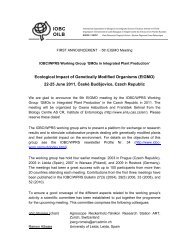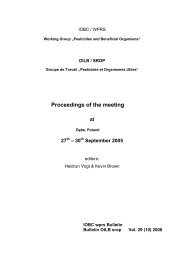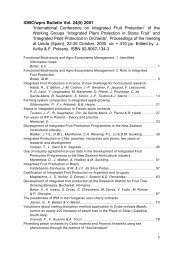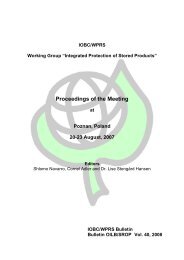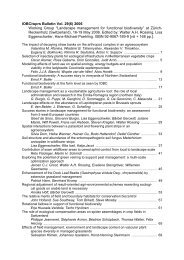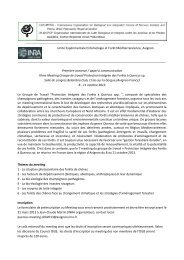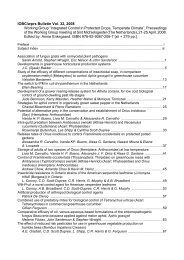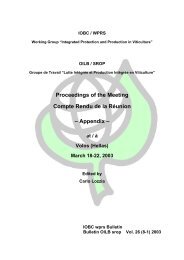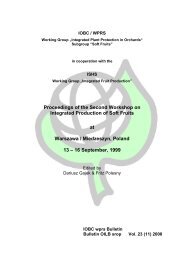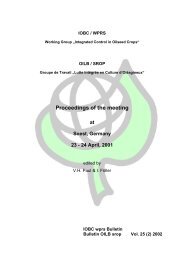Classical and augmentative biological control against ... - IOBC-WPRS
Classical and augmentative biological control against ... - IOBC-WPRS
Classical and augmentative biological control against ... - IOBC-WPRS
Create successful ePaper yourself
Turn your PDF publications into a flip-book with our unique Google optimized e-Paper software.
Chapter 8<br />
Identified difficulties <strong>and</strong> conditions for field success of bio<strong>control</strong>.<br />
4. Socio-economic aspects: market analysis <strong>and</strong> outlook<br />
Bernard Blum 1 , Philippe C. Nicot 2 , Jürgen Köhl 3 <strong>and</strong> Michelina Ruocco 4<br />
1 International Bio<strong>control</strong> Manufacturers Association, Blauenstrasse 57, CH-4054 Basel, Switzerl<strong>and</strong><br />
2 INRA, UR407, Unité de Pathologie Végétale, Domaine St Maurice, 84140 Montfavet, France<br />
3 Wageningen UR, Plant Research International, Droevendaalsesteeg 1, P.O. Box 69,<br />
6700 AB Wageningen, The Netherl<strong>and</strong>s<br />
4 CNR-IPP, Istituto pel la Protezione delle Piante, Via Univrsità 133, Portici (NA) Italy<br />
With estimated sales amounting to only 200 Mio€ in Europe in 2008, the market for <strong>biological</strong><br />
<strong>control</strong> agents appears to be extremely small compared with the 7 000 Mio€ turnover achieved with<br />
chemical pesticides. However, very important efforts have been undertaken for the development of<br />
bio<strong>control</strong> agents. The OECD estimated that 5 000 Mio$ have been spent worldwide in public<br />
research for bio<strong>control</strong> during the last 40 years. This amounts to a yearly average of 500Mio$, not<br />
far from the 600 Mio$ spent yearly in research by the agrochemical industry, but with a<br />
comparatively poor result!<br />
In the Conference on <strong>biological</strong> <strong>control</strong> organised in 2003 by IBMA in Béziers, France, the<br />
major stakeholders (farmers, retailers, distributors, regulators etc.) have provided a list of gaps<br />
considered to play a role in preventing wide adoption of bio<strong>control</strong> products. This list was meant to<br />
cover all potential explanations, but provided neither figures nor priority ranking, making it difficult<br />
to prioritize actions for improvement. It was however a general opinion that the complicated <strong>and</strong><br />
costly system of registration was the major reason of the problem. As a result, important efforts<br />
have been undertaken to convince the regulators to adopt more facilitating procedures for the<br />
registration of <strong>biological</strong>s. These efforts were not without effect <strong>and</strong> the newly adopted “Pesticides<br />
package” makes it easier, under certain conditions, to register <strong>biological</strong>s. In the meantime, several<br />
EU member states have adopted easier registrations tracks, such as the Biopesticides Scheme in the<br />
UK, for example.<br />
In reality, the unique assumption that the current regulations in Europe significantly hamper<br />
the development <strong>and</strong> the use of <strong>biological</strong>s does not seem to be proven by the facts. During a very<br />
long period, the <strong>biological</strong>s were not subject to registration <strong>and</strong> very few products were brought<br />
successfully to the market. At the same time countries such as the USA, New Zeal<strong>and</strong> or Japan have<br />
adopted very liberal registration procedures, but the sales of <strong>biological</strong>s remain marginal.<br />
In the frame of ENDURE, it has been therefore decided to get a detailed <strong>and</strong> quantified idea on<br />
the gaps which, in Europe, restrain the adoption of <strong>biological</strong>s, especially at the users <strong>and</strong><br />
commercial levels. In order to achieve this objective, a Pan-Europa survey was undertaken from<br />
2007 until 2008, with the assistance of the public opinion organisation Agridata.<br />
Methodological approach: survey of European farmers<br />
Since no validated data were available about the real market <strong>and</strong> the use of <strong>biological</strong> <strong>control</strong> agents<br />
in Europe, it has been necessary to build up a form of electronic map of the European agriculture<br />
<strong>and</strong> of the distribution of the potential users.<br />
62



